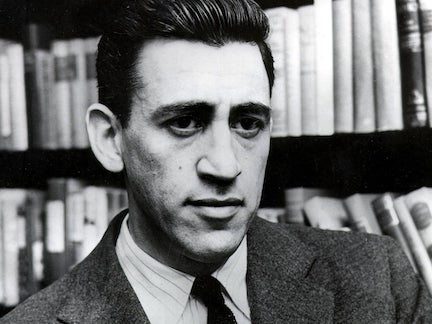J.D. Salinger was a story catcher who wrote books. One of them sells like new today:
Approximately 250,000 copies of The Catcher in the Rye are sold each year – which is almost 685 per day!
The Catcher in the Rye was first published in 1951. That’s quite a record for keeping readers coming back.
Who remembers the first time they read it? Was it a high school English assignment, or college, or just because?
I’m still taken by it to the point of looking for motivation within its pages.
I settled in for dinner last night before working on a book writing project. Instead of watching television I decided to stay in the world of words and ideas.
My plan was to read the first page of the first book I found on the shelf.
It has to be a novel so that leaves out titles like Inspired Creative Writing, How To Write A Book Proposal, The Script Selling Game, Writing Down The Bones, How To Grow A Novel, and a load of other instructive works I like to look at, if not read.
Books That Match My Plan
To my surprise I saw it tucked in under a loose notebook.
The familiar red cover, more than a little worn, with yellowed pages and the same gold lettering front and back: THE CATCHER IN THE RYE with J.D. SALINGER printed underneath.
My story catcher was right there waiting for another moment, which makes me wonder how many times people buy this book because they need a new one, or lost their old one?
With this discovery I decided that work on my book writing project would have to wait, which is what too many writers do before quitting.
Instead, I did what the pros do and borrowed some Salinger for a lift.
About My Book Writing Project
Hugo House, ‘a place for writers’, says:
Imitate, imitate, imitate.
It’s in classes like these that we learn how to give ourselves permission to copy another person’s writing style. We’ve read something that knocks our socks off, and we wish we could do that, too. Growing up we’re told this is some evil approach to creativity, that copying is bad. I can’t understand why, and it bothers me that through this thinking we look at “genius” as this natural gift no one works at.
Imitate? Okay, follow along, story catcher
If you really want to hear about it, the first thing you’ll probably want to know about my project is what it’s about, and is it a real memoir or another personal rant about unfairness, which I don’t feel like going into, if you want to know the truth.
That paragraph was influenced by the first sentence on the first page of Catcher. It’s not copied from, but inspired by. There’s a fine line.
It’s enough, don’t you think? I could go on but I get touchy as hell about it. Besides, a memoir is a personal impression of a period of time, not an autobiography of time immemorial. I”ll just tell you about this madman stuff that happened to me around Christmas a few years ago just after I found a lump, learned everything about it, got pretty run-down and had to take it easy.
This is me imitating J.D. Salinger from the first page of Catcher, which seems weird because I missed this information from other readings: Holden’s older brother is a Hollywood writer with a new car who lived not too far from his crumby place, and he hero-worships him.
His brother used to be a regular writer when he was home. He wrote a terrific book of short stories, The Secret Goldfish. The best one in it was “The Secret Goldfish.”
Salinger makes me laugh for forcing me to read the words ‘secret goldfish’ twice at the bottom of the first page.
That’s Enough For Story Catcher On Page One
The first page gives us a reluctant narrator, an unreliable narrator, selling his story by luring readers in as intruders to his private life.
Generation after generation wants to intrude even more. What better way to get them than by putting up a reluctant hero from the start? After one page the story is launched by someone who takes visitors in a crumby place he’ll be leaving soon, driven back home by his rich Hollywood writer brother.
But where is Holden? Wherever it is is a result of the madman stuff that happened around his last Christmas, so I’m guessing madhouse from the first page.
After the first page I wanted to know things, and I want my memoir to elicit the same want. Every book needs that, or how else would anyone ever make it to the second page on their own?
After reading the first page of Catcher In The Rye, then my first page, it needs work and I expect J.D. to help out. I like writers who go by their first two initials, so I know I won’t be disappointed.



